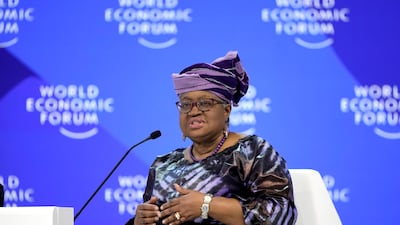Global trade will recover in 2024 but uncertainties stemming from geopolitical frictions and presidential elections in many countries may result in a weaker-than-expected performance, the World Trade Organisation's chief said.
On October 5, the World Trade Organisation (WTO) had forecast 3.3 per cent growth in global trade for 2024, a strong improvement from the 0.8 per cent in 2023, according to its predictions issued before the Israel-Gaza war.
While 2024 will be a better year for global trade than 2023, the WTO Director General Ngozi Okonjo-Iweala told the World Economic Forum in Davos, Switzerland, on Friday that the world is “moving towards normalisation”, but at the same time conditions are “not normal”.
Conflicts, the Red Sea crisis impacting the Suez Canal, the drought-hit Panama Canal and the outcome of presidential elections are raising a lot of uncertainties that make it difficult to forecast global trade trends, she said.
“However, I'll take a bit of a risk and say it will be better than 2023, it may not come in at 3.3 per cent, below that, but much better than what we saw in 2023 – unless a major war breaks out, then all bets are off,” she said.
The WTO chief was speaking at a six-member panel discussion on the global economic outlook as the forum's meetings in Davos drew to a close on Friday.
Following the Covid-19 pandemic and then the Russia-Ukraine war, global trade has been hit with a fresh wave of geopolitical turmoil that has disrupted supply chains worldwide.
The Israel-Gaza war, Houthi rebels attacking ships in the Red Sea, US-China trade tensions and the prospect of a second Donald Trump presidency in America have raised concerns about free trade flows worldwide.
Major shipping companies have suspended operations in the Red Sea after missile attacks by Houthi rebels, who say they are acting in solidarity with Palestinians, disrupting global trade as the war in Gaza continues.
The Red Sea is linked to the Mediterranean by the Suez Canal, making it the shortest shipping route between Europe and Asia.
The canal is a major artery for the flow of goods, with about 12 per cent of the world's shipping traffic passing through it.
US and UK military forces have launched a series of strikes against rebel sites in Yemen, with the Red Sea attacks prompting many companies to take a long and expensive detour around the Cape of Good Hope instead.
The disruption to global shipping in the Red Sea could last at least a few months as Houthi attacks continue, Vincent Clerc, the chief executive of shipping major Maersk, told the World Economic Forum in Davos on Wednesday.
The number of commercial vessels including container ships, tankers and bulk carriers transiting the Suez Canal was down by around 20 per cent to 30 per cent year-on-year as of January 8, according to a Moody's Investors Service report.
Container freight rates have doubled or even tripled compared to a year ago on major east-west routes, though they remain far below the peak in 2021-2022, the rating agency said in its January 17 report.


